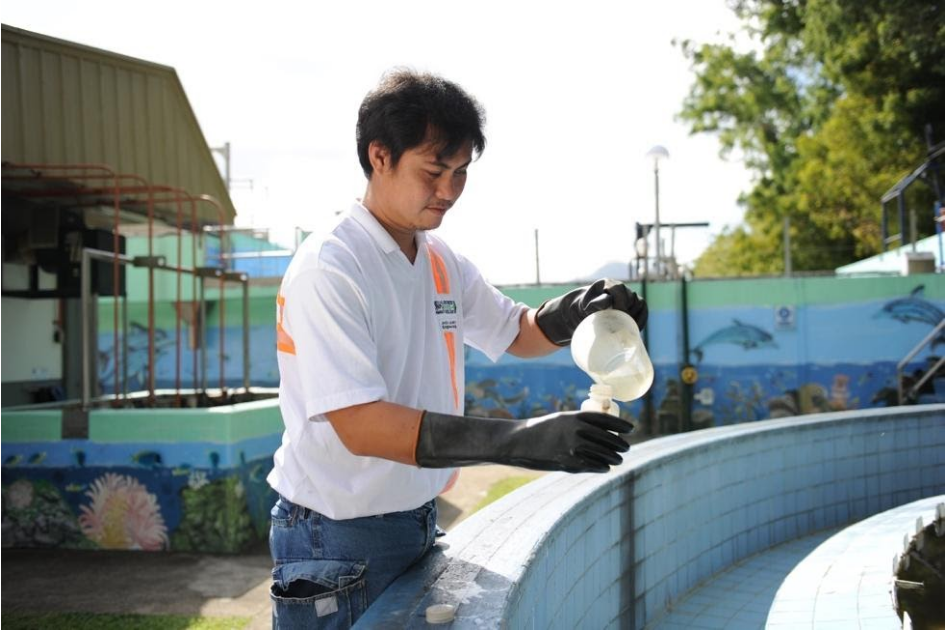PH readying details of green, sustainable bonds

An industrial services operator lifting a wastewater sample for analysis at a Nestlé Philippines factory. The PCCI 2020 “Excellence in Ecology and Economy” or E3 Award recognizes the company’s environmental stewardship through its programs on sustainable packaging, solid waste management, climate change, and optimizing the use of energy and water resources.
MANILA, Philippines—The Philippine government has come up with its sustainable finance framework to borrow funds for programs and projects aimed at fighting climate change and promoting inclusive growth.
In a statement, the Bureau of the Treasury said the sustainable finance framework put in place guidelines to raise green, social or sustainability bonds and loans, among other debt instruments, in international capital markets.
“The framework marks an important milestone for [the government’s] sustainability journey and the Philippine sustainable finance market more broadly,” said the Treasury in a statement.
“With this framework, and any financing under this framework that may follow, the government intends to contribute to the development of the sustainable financing market domestically in the Philippines,” the Treasury said.
“The framework lays out the process that will be used to ensure transparency and disclosure of the use of proceeds, as well as the expected environmental and social impact of eligible green and social projects, in keeping with international best practices,” the Treasury added.
Article continues after this advertisementUnder the framework completed in November 2021, proceeds from sustainable financing instruments can finance social expenditures like:
Article continues after this advertisement- Education and health care for the poor, people with disabilities (PWDs) and unemployed
- Basic infrastructure in rural areas
- Food security for farmers and disadvantaged populations
- Support to micro, small and medium enterprises (MSMEs)
- Job creation
- Social assistance like conditional and unconditional cash transfers
- Low-cost and socialized housing.
Amid the prolonged pandemic, this financing may also be tapped for COVID-19 response.
“Green” expenditures were also eligible for sustainable fund-raising, including projects promoting clean infrastructure, climate change adaptation, renewable energy, and environmentally sustainable management of living natural resources and land use.
Programs in line with the Philippines’ 2030 commitments under the United Nations’ (UN) sustainable development goals (SDGs) will also be funded through this financing scheme.
The achievement of targets in the medium-term Philippine development plan (PDP) and public investment program (PIP) aimed at infrastructure development would also be supported by the sustainable finance framework.
In November 2021, Finance Secretary Carlos Dominguez III said the Philippines’ maiden “green” bond offering was in the pipeline, specifically to raise public funding for climate projects.
National Treasurer Rosalia de Leon on Friday (Jan. 14) declined to give a timetable or possible size of the forthcoming green bond issuance. “We will let you know” when the offering’s ready, she said.
In a recent joint report on green infrastructure investment opportunities, the Securities and Exchange Commission (SEC) and the Manila-based multilateral lender Asian Development Bank (ADB) noted that issuance of a sovereign green bond would “send a strong signal to the market” of the Philippines’ commitment to green finance.
“Sovereign bonds are well-understood, frequently issued products that are included in most investment strategies,” the report said.
“A sovereign green bond can kickstart a local green bond market by bringing scale to domestic markets through benchmark pricing, liquidity, and precedent,” according to the report.
“For governments with access to domestic and international capital markets, sovereign green bonds can also help attract the private sector-based investment needed for sustainable developments and to fulfill the objectives of its NDC” or national determined contribution to fight climate change under the Paris Agreement, it added.
The Philippines had ambitiously committed to slash greenhouse gas emissions by 75 percent in the next 10 years.